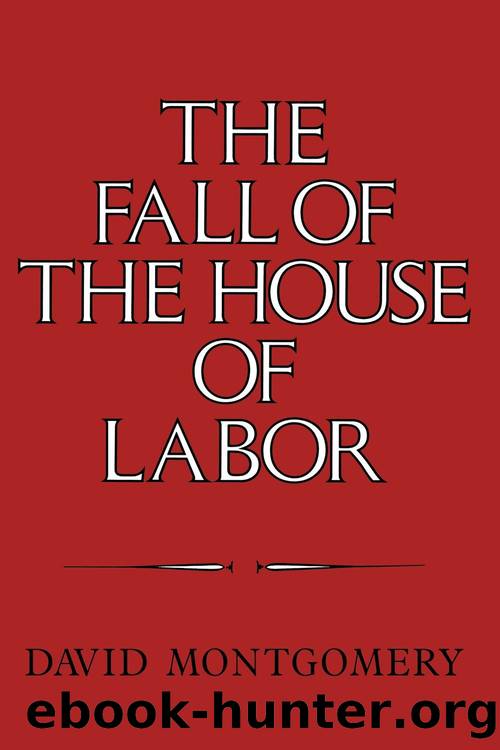The Fall of the House of Labor by David Montgomery

Author:David Montgomery [Montgomery, David]
Language: eng
Format: epub
Publisher: Cambridge University Press
Published: 1987-08-28T00:00:00+00:00
6
âOur time . . . believes in changeâ
The Chicago Civic Federation gathered representatives of those whom its secretary called the âsolid, unselfish, humane, Christian, educated element of the nationâ for two highly successful conferences as the nineteenth century drew to a close. One, held at Saratoga Springs in 1898, dealt with the future foreign policy of the United States as a world power. The second, convened in Chicago in 1899, dealt with the role of âcombinations and trustsâ in the emerging economic order.1
Among the participants in the latter was M. M. Garland of Pittsburgh, who had left his heating furnace to assume the presidency of the Amalgamated Association of Iron, Steel and Tin Workers just as the Homestead strike was going down to defeat. His speech to the conference was optimistic but cautious. His hopes were based on the fact that with the return of prosperity, wages were rising and his union was growing again; it had even instituted a workday of three eight-hour turns for most of its remaining members in midwestern iron-rolling mills. He had left both the union office and the mills behind him when President McKinley had appointed him Pittsburghâs collector of customs. Addressing himself to the current wave of mergers in the business world, Garland declared that whether or not the nation âtoleratedâ trusts would depend on their behavior toward workers. Antitrust laws should be avoided, because the courts had applied them unhesitatingly against unions. The great peril was the âwantonâ slashing of wages that steel companies had practiced during the depression years. If trusts would secure the earnings of their employees, rather than competing aggressively for customers, and if they would âtreat with organizationsâ of their workers, they could indeed provide the economic foundation of a better society in the century to come.2
The trade unions, which had sprung from the work cultures and daily struggles of the craftsmen, had entered a period of unprecedented growth after 1897. Nevertheless, they still represented but a small minority even of the skilled workers of the land, and nowhere was this more evident than in the steel industry. Its major corporations had snuffed out the unionâs major lodges during the previous decade, and the most famous of the trusts, U.S. Steel, was to humble the Amalgamated Association in a nationwide strike less than two years after Garlandâs speech. Even more important, in that industry and others, sharply contrasting earnings, work practices, life-styles, and even social origins separated the craft workers, unionized or not, from the more numerous operatives and laborers. New technology and new managerial practices were beginning at that very moment to transfer the dominant role in production toward less skilled workers and to blend the diverse experiences and lives of laborers and operatives. In these respects, work experience was being homogenized, although the working class remained anything but homogeneous.
Business executives, who were reshaping work relations as well as merging enterprises into âtight combinations,â were often captivated by a new rhetoric that counterposed âefficiency,â âorganization,â âexpertise,â and
Download
This site does not store any files on its server. We only index and link to content provided by other sites. Please contact the content providers to delete copyright contents if any and email us, we'll remove relevant links or contents immediately.
The Secret History by Donna Tartt(19038)
The Social Justice Warrior Handbook by Lisa De Pasquale(12184)
Thirteen Reasons Why by Jay Asher(8887)
This Is How You Lose Her by Junot Diaz(6873)
Weapons of Math Destruction by Cathy O'Neil(6263)
Zero to One by Peter Thiel(5784)
Beartown by Fredrik Backman(5734)
The Myth of the Strong Leader by Archie Brown(5495)
The Fire Next Time by James Baldwin(5429)
How Democracies Die by Steven Levitsky & Daniel Ziblatt(5211)
Promise Me, Dad by Joe Biden(5141)
Stone's Rules by Roger Stone(5080)
A Higher Loyalty: Truth, Lies, and Leadership by James Comey(4947)
100 Deadly Skills by Clint Emerson(4917)
Rise and Kill First by Ronen Bergman(4776)
Secrecy World by Jake Bernstein(4739)
The David Icke Guide to the Global Conspiracy (and how to end it) by David Icke(4699)
The Farm by Tom Rob Smith(4501)
The Doomsday Machine by Daniel Ellsberg(4483)
